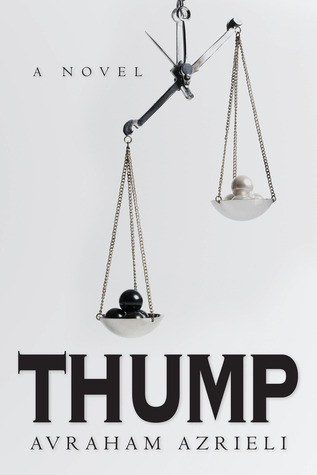Author: Avraham Azrieli
Title: Thump
Publisher: Create Space
ISBN: 9781494281755
Pages: 278, Paperback/Kindle
Genre: Fiction
Author Interview with Avraham Azrieli
Author Interview Questions – Avraham Azrieli
Title: Thump
Interviewed by: Lisa Brown-Gilbert, Pacific Book Review
PBR: A very interesting and engaging read: I noticed a number of similarities between Thump and the film Philadelphia. Was this movie an inspiration or a creative tool for writing this book?
Having worked in and around courtrooms for over two decades, I’d say that my main inspiration for writing Thump has been real life. My experiences as a lawyer, the people I’ve worked with, worked for and—most importantly—those I worked against, have given me plenty of realistic material for captivating conflicts. As courtroom dramas go, of course, Philadelphia is incredible particularly because, like Thump, it deals not with a crime but with a moral conflict born of prejudice. I have also loved Civil Action, Presumed Innocent, Primal Fear, Class Action, The Accused, The Verdict, A Few Good Men, and the best of all, Inherit the Wind.
PBR: Names played a role in this novel. I always look at how names a signs suggest historical figures, events, ideas, etc. Could you talk about the names, “namely” the main character Thurgood Marshall Jefferson and perhaps the company KKG (being so close to that other acronym KKK)?
Like any parent choosing a name for a newborn, naming a character in a novel is a process that starts with inspiration, vexes with contemplation and ends with a concession. Indeed, the late Associate Justice of the U.S. Supreme Court, Thurgood Marshall, had done more than any other American to assert the rights of African Americans (and all Americans) to be treated equally and without discrimination. For Mrs. Jefferson, I felt, the name would be high on the list when her baby boy was born, even if she didn’t know at the time that he would end up going to court to assert his rights against a discriminating employer. For me, the same mental process takes place with respect to each character in the book, especially the leading actors and the company’s name.
PBR: Given the history of sexual harassment, in general and within KKG in the novel, there is the suggestion that the corporate world is still an “old white boys club.” While this story is an indictment of patriarchy and the echoes of racism, is it also an indictment of capitalism, that is – of owning property and analogously of owning people and/or their labor?
The novel does parallel several social conflicts that continue to plague America, perhaps going back to the era of slave economy and women’s subjugation. But it is a very current story, totally of our time. Rather than an indictment of any particular group or idea, Thump is a courtroom drama that brings to life the real-world human conflicts between young and old, men and women, rich and poor, and white and black. Besides, it explores the give-and-take that sexually attractive people engage in to obtain what they need, how far they would go, and what horrendous consequences could result when things go wrong in that arena. Add to that the intense and volatile flashpoints of race and sex, and you find yourself in Thump’s devastating predicament.
PBR: Some words on the complexity of the main character: Thump or Thurgood. He was certainly not infallible. He played the dirty games of office politics in order to help him climb the company ladder. What made you decide to portray him as a flawed (rather than a flawless, totally innocent) character?
Flawless, totally innocent people rarely exist, if at all. I haven’t met one yet. The main character, Thump, is a combination of men I’ve worked with or known socially—bright, driven, confident (or cocky)—and a bit reckless, especially when it comes to sex. He is quick-witted, ambitious and decisive—the qualities necessary for an African American kid from a poor neighborhood in Baltimore to succeed in the white-man’s business world. But he also has a good heart and, like most men, he loves his mother and is determined to make her proud. His nickname, “Thump,” is not only an allusion to a more abrasive four-letter word, but also mirrors the novel’s attributes—succinct, explicit and shocking—like a good thump on the head.
PBR: Given your research in writing this novel, what are your thoughts on affirmative action? And how rampant do you think sexual harassment still is? And maybe a few words on how victims become perpetrators (notably the characters Klingman and O’Connor for instance)? These all seem to be prominent issue in the novel.
There is no question that sexual harassment in all its forms and variations is incredibly resilient, not only in the workplace, but in the military, within families, and in every hierarchical environment where men and women (or men and men, or women and women) exert power over one another—and can extract sexual favors. Any situation of dependency—financial, emotional, social, academic, etc.—offers the opportunity for sexual dealings. In some situation, such as the story of Thump, it’s terribly difficult to tell where the line separates victim from perpetrator, consensual sex from predatory imposition, and a mutual arrangement from sexual harassment. That’s the challenge facing the jury (and the reader) in the case of Thump.
To learn more about “Thump” please read the review at: Pacific Book Review


